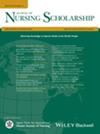Precision health: Determining the capacity of practicing nurses across the United States
Abstract
Introduction
Precision Health (PH) holds the promise of revolutionizing healthcare by enabling personalized disease prevention and management through the integration of genomic data, lifestyle factors, environmental influences, and other social determinants of health (SDoH). However, the absence of a baseline assessment of knowledge, skills, and attitudes (KSAs) of practicing nurses' capacity for PH hinders its integration. The purpose of this study is to determine the capacity of practicing Registered Nurses (RNs) for PH across the United States and to assess the validity and reliability of a tool designed for this use—the Precision Health Nurse Capacity Scale (PHNCS).
Design/Method
A descriptive exploratory study was conducted to evaluate the capacity of practicing RNs for this evolving phenomenon, PH, using a convenience sample. The survey was sent via email and made available to all members of the American Nurses Association (ANA) who work in a variety of practice environments. The ANA represents the over 4 million nurses practicing in the United States.
Results
The majority of nurse respondents felt it is important for nurses to become more educated about all aspects of PH including SDoH but they lack confidence in the integration of PH. The PHNCS was found to be a valid and reliable tool in measuring the capacity of nurses to practice PH.
Conclusion
The incorporation of PH into nursing practice suffers an immediate impediment: the lack of know-how of the US nursing workforce. This inaugural data on KSAs for PH establishes a logical baseline from which the requisite education and training should commence.
Clinical relevance
Precision Health is an emerging healthcare approach in the United States and globally. Enabling it will require a nursing workforce prepared with the requisite KSAs. Determining the capacity of the nursing workforce is a foundational step to begin this process.


 求助内容:
求助内容: 应助结果提醒方式:
应助结果提醒方式:


